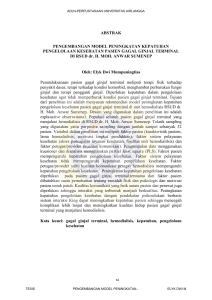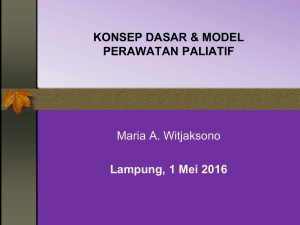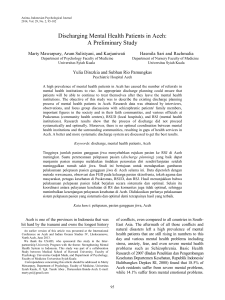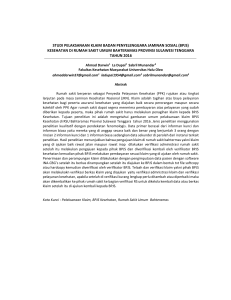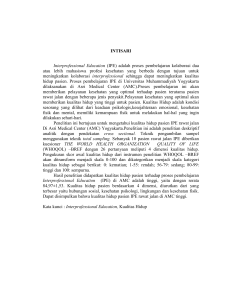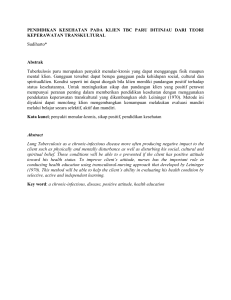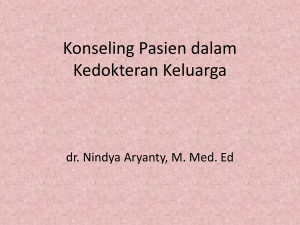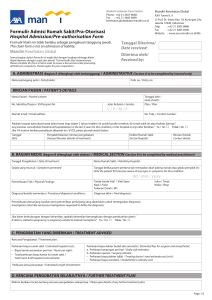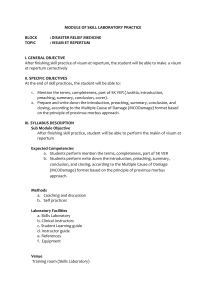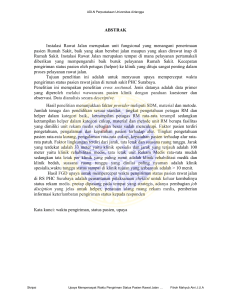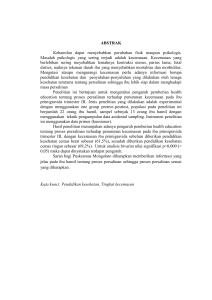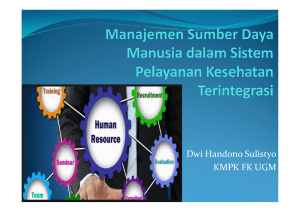Patient safety in radiology field - PIT TORAKS KE
advertisement
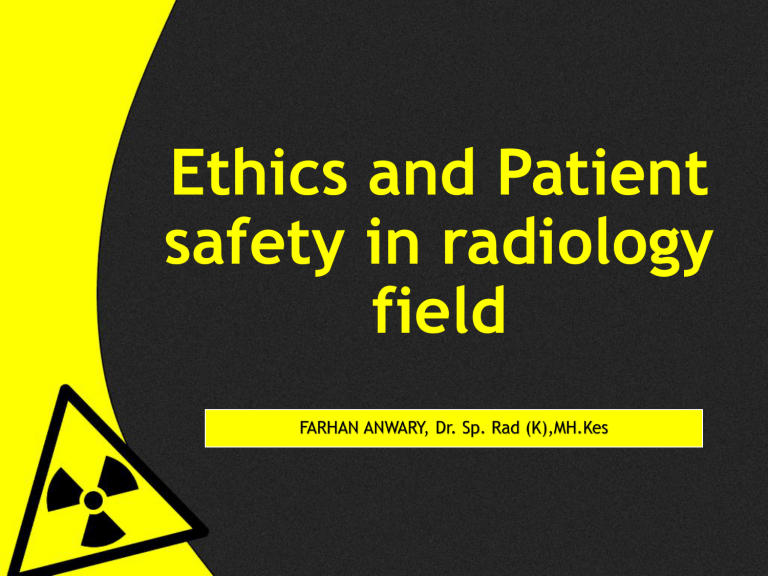
Ethics and Patient safety in radiology field Background 1949, dr Henry Garland : Errors of perception at image interpretation November 1999, the American Hospital Asosiation (AHA) Board of Trustees : Patient safety is a priority strategic 2000, Institute of Medicine, United States : 3- 16 % adverse event in hospital PATIENT SAFETY PRIMUM, NON NOCERE FIRST, DO NO HARM HIPPOCRATES’S TENET (460-335 BC) Hippocrates (yunani) Inhotep (mesir) Galenus (roma) Pelopor kedokteran kuno Tradisi dan disiplin alas etik profesional Reported overexposed 1980 - 2013 GENERAL ERRORS 2010, Jones et al 1. Patient identification and events involving the wrong patient, wrong procedure, or wrong side or site 2. Diagnostic errors, including image perception and interpretation; failure to transmit, understand, and act on medical imaging reports; and problems with documentation 3.Communication failure, particularly at times of patient handover and handoff. Philosophical Approach to Safety: Traditional versus Modern View The traditional view sees human error as a cause of accidents The modern view sees events attributedto human error as a symptom of trouble deeper inside a system. PERMASALAHAN ETIKA Malpraktik BUDAYA KESELAMATAN Kelalaian dalam penanganan pasien PASIEN Diskriminasi terhadap pasien BUDAYA KESELAMATAN PASIEN KODE ETIK PROFESI KODE ETIK KEDOKTERAN PRINSIP ETIKA KEDOKTERAN 1. Autonomy Kebebasan pribadi untuk suatu tindakan menunjukkan kemandirian percaya diri, kebebasan memilih dan kemampuan untuk membuat keputusan 2. Nonmaleficence Kewajiban untuk tidak menimbulkan mudharat 3. Beneficence Kewajiban berbuat baik 4. Justice Berlaku adil • ln lndonesia, many problems are not revealed; cases of suspected malpractice, negligence in handling of patients, discriminate against patients and others. • Medical personnel have an important role in creating a quality health services including implementing patient safety culture. • Currently patient safety culture does not exist yet in health careThe evidence are the persistence reports of malpractice cases,discrimination, and others. • Each health profession has a code of ethics. The existence of a code of ethics should be an aspect in the implementation of safety culture pasien. • Undang-undang Rumah Sakit No 44 Thn 2009, it was clear to say that patient safety is a factor that should be prioritized by health workers compared to other factors. • To implement the patient safety cullture and run code of professional conduct require good organizational climate. • Ethical aspecfs become an imporlant part of patient service. RADIATION SAFETY ALARA (AS LOW AS RESONABLY) GOALS : • ELIMINATE DETERMINISTIC EFFECTS (TISSUE REACTION) • REDUCE INCIDENCE OF STOCHASTIC EFFECTS (CARCINOGENIC & GENETIC EFFECT) LIMITING EXPOSURE • MINIMIZE EXPOSURE TIME • MAXIMIZE DISTANCE FROM THE X-RAY TUBE • USE SHIELDING EFFECTIVE RADIATION DOSE IN ADULTS EFFECTS OF RADIATION EXPOSURE • EXPERTS SAY EVEN SMALL RADIATION DOSES, AS LOW AS 100 MILLISIEVERTS (mSv), CAN SLIGHTLY RAISE CANCER RISK X-RAY & CT CONTRAST GUIDELINE • Practical Aspects of Contrast Administration • Patient Screening Prior to Administration of Iodinated Contrast • Administrative Process for Iodinated Contrast • Vascular Access and Use of Central Lines and Ports in Adults • Vascular Access and use of Central Lines and Ports in Pediatrics • Background Information on Adverse Effects of Iodinated Contrast MRI SAFETY GUIDELINES WHAT CAN GO INTO THE MAGNET 1. ABSOLUTE CONTRAINDICATION 2. RELATIVE CONTRAINDICATION 3. CORONARY STENTS 4. PACEMAKERS, ICDs, PACING WIRES AND LOOP RECORDERS 5. SCREENING PROCEDURES CT & MRI DURING PREGNANCY GUIDELINES • Signs should be prominently displayed in all radiology departments asking each patient to notify a technologist or physician if she is, or thinks she could be, pregnant. • All technologists should ask women of childbearing-age if they might be pregnant prior to performing a radiologic procedure. • Radiology requisition forms filled out by referring physicians should include a section dealing with the possibility of pregnancy. • No radiological procedure involving exposure to the pelvis should be undertaken in a patient who declares she may be pregnant without consultation with a radiologist. The radiologist should discuss risks and benefits with the patient, and determine if it is appropriate to proceed, perform an alternative procedure, or delay the study to allow performance of a pregnancy test. OCCUPATIONAL RADIATION SAFETY IN RADIOLOGICAL IMAGING SCATTER RADIATION RADIATION DOSE MONITORING • THERMO-LUMINESCENT DOSIMETERS • REAL-TIME MONITORING DEVICES • AREA SURVEILLANCES USING SURVEY METERS • Recommended use of at least two dosimeters, one above and one underneath the lead apron. They allow risk estimation for the deterministic effects (such as cataract) and the stochastic effects (such as cancer risks), respectively. LEGAL ASPECT • Keputusan Menteri Kesehatan Republik Indonesia Nomor 496/Menkes/Sk/Iv/2005 :Tentang Pedoman Audit Medis Di Rumah Sakit Menteri Kesehatan Republik Indonesia, • Peraturan Menteri Kesehatan Republik Indonesia Nomor 1691/Menkes/Per/Viii/2011 : Tentang Keselamatan Pasien Rumah Sakit • Undang-undang Rumah Sakit nomor 44 tahun 2009 UU No.23/92 Ttg KESEHATAN KESEHATAN SUMBER DAYA KESEHATAN TENAGA KES. ▪ ▪ ▪ ▪ DOKTER BIDAN PERAWAT APOTEKER UPAYA KESEHATAN PELAY KES. SARANA KES. PEMELIHARAAN KES. UPAYA KES. ▪ R.S ▪ PKM ▪ PRAKTEK DOKTER ▪ POLIKLINIK INDIVIDU HUB TENAGA KES. PASIEN MASYARAKAT ▪ PPM ▪ UKS ▪ KESUNG R.S TERBENTUK HUBUNGAN MEDIK HUBUNGAN HUKUM HUB UPAYA KES. KURATIF PREVENTIF RHTATIP PROMOTIF SUBJEK HUKUM SUBJEK HUKUM Standar Etika Input dan Proses ▪ Standar Pendidikan Profesi • Hardware • Software (al: kurikulum) • Brainware 1 Output Sistem Pendidikan Standar Kompetensi 2 Memberikan Amanah UUPK: ▪ Standar Pendidikan Profesi (Pasal 26) ▪ Standar Kompetensi (Pasal 27) Globalisasi & Desentralisasi Regulasi& Standarisasi (Pemerintah & Profesi) Pendidikan Ijazah (Sekolah) Standar Profesi 1. Standar Etik 2. Standar Kompetensi Dr/Spesialis Sertifikat Kompetensi (Profesi) Registrasi KompetensiKewenangan 3. Standar Pendidikan Profesi 4. Standar Pelayanan Medik *)Tanggung Jwb KKI Majelis Kehormatan Disiplin Lisensi (Izin Praktek) (Pemerintah Daerah & Profesi) Praktek Dokter Masyarakat Masalah Disiplin Masalah Etik Masalah Hukum PATIENT SAFETY IN RADIOLOGY • Dose limits for professionals and diagnostic reference levels for patients • Dose limits are applied to workers and to the members of the public. In Europe, the practical dose limit for ED in workers is 20 mSv/year. For the eye lens, a new annual dose limit for workers of 20 mSv/year has recently been recommended by the ICRP instead of the current 150 mSv/year • Dose limits do not apply to patients because the priority is always the clinical benefit, and radiation is only an ‘instrument’ to diagnose or to guide the procedure Conclusion Safety is a function of operational elements such as individual skill, processes, technology, and organizational culture. Safety is produced when organizations establish standards for what is expected and implement systems to (a)Recognize potential errors early by detecting deviations from standards, (b)Quickly and effectively solve specific problems as they arise before they cause harm, and (c)Quickly learn from problems and change the organization accordingly so that problems do not recur. Reference 1. Larson D B, Kruskal J B, Krecke K N, Donnelly L F. Key Concepts of Patient Safety in Radiology. 2015.RSNA 2. Coeytaux k, bey e, christensen d, et all. Reported radiation overexposure accidents worldwide, 1980 – 2013 : a systematic review. 2015. United states 3. Depkes RI, 2011. Peraturan menteri kesehatan republik indonesia nomor 1691/menkes/per/viii/2011 4. Depkes RI, 2005. Keputusan menteri kesehatan republik indonesia nomor 496/menkes/sk/iv/2005 5. Undang-undang rumah sakit nomor 44 tahun 2009 6. Bapeten, 2013. Peraturan kepala badan pengawas tenaga nuklir nomor 4 tahun 2013. HATUR NUHUN Thank you
